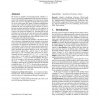Free Online Productivity Tools
i2Speak
i2Symbol
i2OCR
iTex2Img
iWeb2Print
iWeb2Shot
i2Type
iPdf2Split
iPdf2Merge
i2Bopomofo
i2Arabic
i2Style
i2Image
i2PDF
iLatex2Rtf
Sci2ools
TOCS
2008
2008
Adaptive work-stealing with parallelism feedback
We present an adaptive work-stealing thread scheduler, ASTEAL, for fork-join multithreaded jobs, like those written using the Cilk multithreaded language or the Hood work-stealing library. The A-STEAL algorithm is appropriate for large parallel servers where many jobs share a common multiprocessor resource and in which the number of processors available to a particular job may vary during the job's execution. A-STEAL provides continual parallelism feedback to a job scheduler in the form of processor requests, and the job must adapt its execution to the processors allotted to it. Assuming that the job scheduler never allots any job more processors than requested by the job's thread scheduler, A-STEAL guarantees that the job completes in near-optimal time while utilizing at least a constant fraction of the allotted processors. Our analysis models the job scheduler as the thread scheduler's adversary, challenging the thread scheduler to be robust to the system environment ...
Related Content
| Added | 15 Dec 2010 |
| Updated | 15 Dec 2010 |
| Type | Journal |
| Year | 2008 |
| Where | TOCS |
| Authors | Kunal Agrawal, Charles E. Leiserson, Yuxiong He, Wen-Jing Hsu |
Comments (0)

